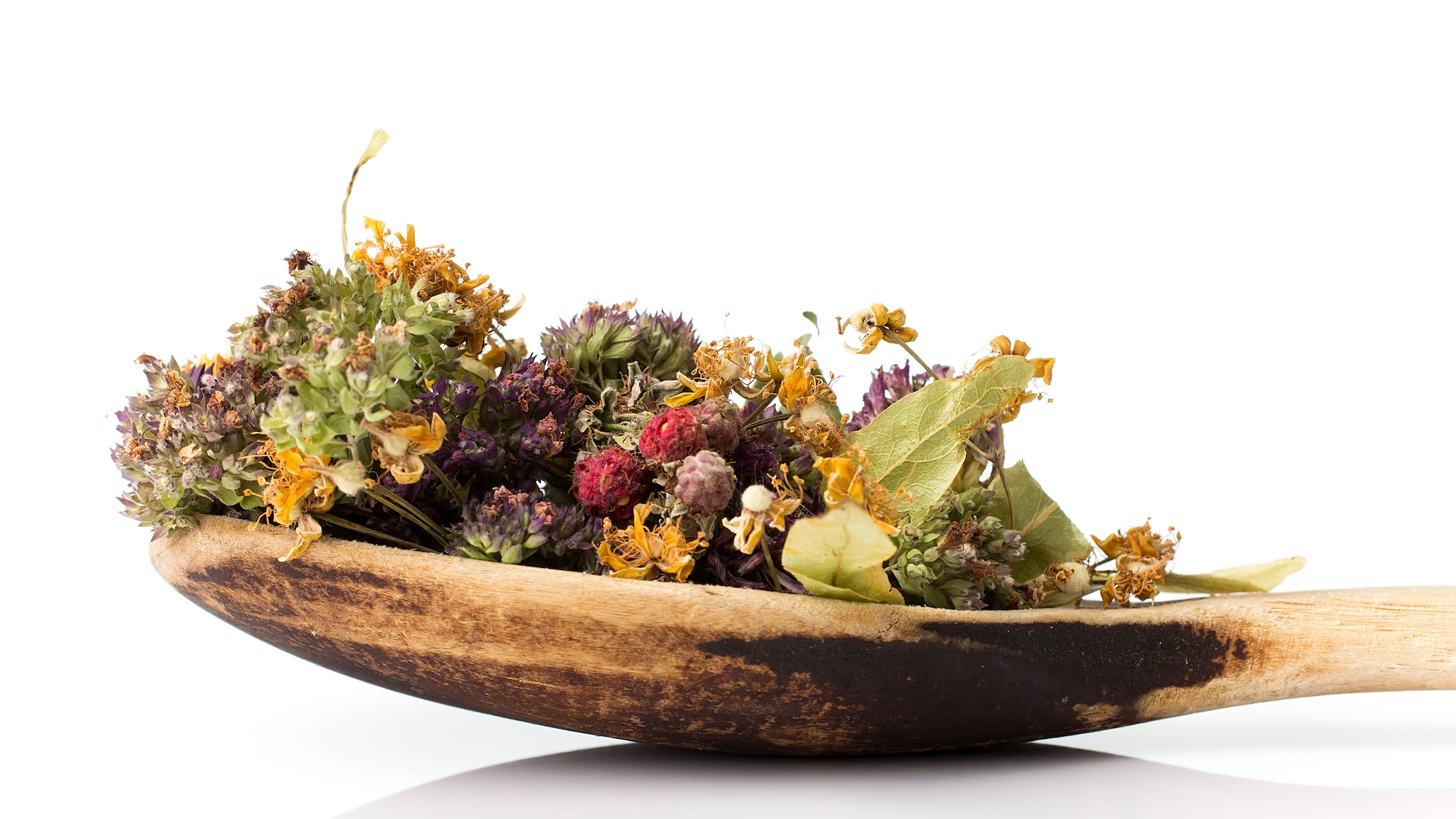Herbal Medicine


What is it?
Herbal medicine also referred to as botanical medicine, is a medical system based on the use of plants or plant extracts that are taken internally or applied to the skin. Herbal remedies are well rooted in medical practice. Since ancient times, doctors have collected information about herbs to treat a variety of illnesses and to assist with bodily functions.
Until the 1950s, herbs were the basis of all pharmaceutical drugs. Even today, more than a quarter of all medicines used today derive from herbs, such as opium, aspirin, digitalis, and quinine. Others are extractions from plants such as corticosteroids and oral contraceptives.
The terms botanical and herbal are typically interchangeable terms. Strictly speaking, however, the terms botanical medicine includes plant parts that are not strictly herbs, such as bark, seeds, roots, and stems.
Core philosophy
Natural wonders
Herbs contain a large number of naturally occurring chemicals (constituents) that have some type of biological activity. Herbs work in a similar fashion to many pharmaceutical preparations. In fact, as mentioned above, some pharmaceutical medicines come from plants.
Western herbalists, however, believe that herbs should be in their complete form to ensure the balance of constituents contained in the plant. They consider that herbal remedies are of most benefit when used to treat chronic, ongoing conditions. There are generally no quick-fix herbal treatments.
Likewise, herbalists also believe that herbs can help treat a variety of conditions, without the side effects often found in conventional pharmaceutical treatments. With that said, it is important to mention that herbs can be quite potent and can cause serious adverse effects if used incorrectly.
Also to consider, some herbs can affect how the body responds to prescription and over-the-counter medicines, either decreasing or increasing their effects. For example, St. John’s wort can interfere with birth control pills, and ginkgo biloba can increase your risk of bleeding with anticoagulant (blood-thinning) medicines.
What makes plant medicine superior in many cases is that plants have a unique and exact cocktail of several compounds, not just one isolated chemical, like a pharmaceutical. This means a more balanced effect with minimal side effects. This allows the body to heal and recover naturally.
With herbal medicines, the effect is much more gentle, balanced, and healing. Usually, it supports and encourages the organ or system under treatment to function properly. This means after a course of treatment with herbal medicines, the body could potentially heal. More often than not, one can stop herbal treatments without a rebound effect or relapse.
Herbalism across practices
Herbalism extends across different practices. Naturopaths, TCM doctors, Osteopaths, etc., all have academic and practical knowledge in the use of herbs. Naturopaths, for example, are doctors with a license and have studied herbology as part of their education. Herbologists, on the other hand, are specialists in the field. Other practices use herbology as one additional tool in their toolbox.
Some of the most popular herbal remedies and the conditions they can help with include:
- Aloe, used topically for minor burns, sunburns, and inflammation.
- Arnica, used topically for bruises, sprains, sore muscles, and joints.
- Chamomile, used for upset stomach, heartburn, indigestion, and colic.
- Dong quai, used by women to improve general health and stamina.
- Echinacea, used for colds, flu, and sore throat.
- Garlic, ingested to possibly reduce cholesterol and blood pressure, treat fungal infections and colds.
- Passionflower, ingested for non-sedating relaxation.
- Turmeric, ingested to combat inflammation and protect against cancer and Alzheimer’s disease.
- Valerian, ingested for sleeping problems.
With hundreds of others.
History
Early origins
The first record of medicinal plants dates back to over 5,000 years ago by the Sumerians. They described a dozen herbal recipes calling for the use of over 250 plants. Around 1500 BCE, the Egyptians wrote the Ebers Papyrus, which listed over 850 herbal medicines. It included many herbs used today, like cumin, coriander, garlic, willow, cedar, frankincense, aloe, and henna.
Another early herbal tradition is Ayurveda. The Charaka Samhita, mentions over 300 herbs, many of which are still used today. Some like ashwagandha, shatavari, bacopa, turmeric, and tulsi, have become common in Western herbal practice as well. In Chinese medicine, the materia medica lists over 365 herbs. Many of these herbs are widely used in the practice of Chinese medicine today. They include astragalus, licorice, reishi, ginger, schisandra, and dong quai.
The roots of contemporary Western herbal practice come from Greek physicians, most notably Hippocrates, around 400 BCE. Hippocrates and his fellow thinkers were some of the first to write down a system that separated medicine from religious practice. The use of herbs in Greece lived on. In the 10th century, the Salerno school in Southern Italy became a center of medical learning in medieval Europe. At the same time, monasteries throughout Europe also contributed to the development and documentation of herbal and medical practices.
Western herbalism
The explosion of printing in the period between the 15th and 17th centuries gave birth to the first herbal book in English, the Grete Herball. Nicholas Culpeper published an extensive book on pharmaceuticals, herbal knowledge, and the practice of astrological medicine. His books made their way to the American colonies. The English Physician was printed in Boston in 1708, making it both the first medical text and the first book on herbalism printed in America.
American medical botanists learned about the native North American flora largely from the indigenous people who had worked with these plants for centuries. By the 19th century, the practice of medicine had veered away from the use of simple herbs and emphasized the use of “heroic medicines” including purging, bloodletting, and harsh, even toxic minerals such as arsenic and mercury. A group of physicians stood out against the prevailing wisdom of the day, instead of focusing on the use of botanical remedies and innovative, less invasive therapies.
Later on, the American Medical Association came along. The AMA determine to standardize medical education and set very specific standards of operation. Homeopathy, naturopathy, chiropractic, osteopathic medicine, and eclectic medicine were in strong competition to allopathic medicine. Schools offering training in any of these disciples were forced to drop these courses from their curricula or lose their accreditation.
Herbalism began a resurgence in America in the 1960s and 1970s, and its acceptance and popularity have slowly gained momentum in the last decades. The use of herbs has now begun to enter conventional medicine as part of the integrative medicine movement. Herbs are often used by licensed practitioners of osteopathic or naturopathic medicine. And, of course, herbs are available all around us, not only on grocery store and apothecary shelves but in our gardens.
Benefits and uses
Plants have natural healing properties that promote wellbeing in the body and mind. Herbal medicine is a rather elegant system, in that hundreds of individual herbs can each have unique properties and functions. Individual herbs can be used on their own, but they are more often combined into formulas that enhance their unique healing quality and target particular conditions.
Herbal remedies come in many forms and can be used both internally and externally. For internal use traditionally, raw herbs are boiled, simmered, and then drank as a tea. Today, to avoid the bitter taste of herbal concoctions, herbs also come in powdered form and as capsules, tinctures, and tablets.
Herbs can treat a wide range of conditions. It is important to follow the daily dosage and frequency recommendations from your practitioner. This is important because, with western medicinal remedies, one can feel the effects almost immediately. It can take a few days to start feeling the effects of herbal medicine. This does not mean herbal medicine is less effective, rather its mechanism of action is different.
Modern research shows that the benefit of herbs comes from the effect they can have on the body’s systems. Herbs can be:
- Adaptogenic: meaning they help the body adapt to stress by exerting a normalizing effect upon bodily processes.
- Nootropic: meaning they enhance memory or other cognitive functions.
- Immunomodulatory: meaning they modify the body’s immune response.
- Anti-microbial: meaning they fight bacteria or funguses.
- Anti-viral: meaning they fight viral infections.
- Anti-inflammatory: meaning addresses the degree of inflammation.
- Antioxidants: meaning they stop the chemical reaction in the body that can produce free radicals and damage cells.
Thanks to all of these properties (and others), herbal medicine can treat various common ailments, including digestive issues, musculoskeletal pain, stress, anxiety, insomnia, and fertility.
Who practices it
Herbalism is actually practiced by a range of health professionals, from herbalists to chiropractors to naturopathic doctors. In particular, herbal medicine is a mainstay of naturopathic physicians, who use natural approaches to promote wellness. And with increasing numbers of patients interested in complementary therapies, even conventional medical practitioners may seek out herbalism training to enhance their skill sets.
Most herbal therapy training will include curriculum in botany and plant identification, pharmacology, human physiology, biochemistry, nutrition, the history and philosophy of herbalism, and issues of professional practice. Many herbal medicine schools also teach clinical skills such as assessment and recordkeeping.
To become a practicing herbalist, the American Herbalists Guild recommends a program of at least 1,600 hours of study at a school of herbal medicine, including a 400-hour clinical requirement. Naturopathic physicians must complete a bachelor’s degree as well as a 4-year Doctor of Naturopathic Medicine (NC) program.
Currently, many states require licensing for naturopathic doctors. For graduates of herbalism school, there is no specific federal- or state-level regulation. However, if you work as a chiropractor or other health practitioner, you may have to meet licensing requirements for that field in order to practice. Membership in the American Herbalist Guild grants an additional degree of formalism. Finding members in the American Herbalist Guild is probably the easiest and fastest way to find an herbalist near you.
What to expect
If you have a complex medical history, it is a good idea to write down your major health issues in chronological order. Include on this list any medical diagnosis you have had, and any prescribed medication you have taken, and whether it helped you or not. If you have tried any herbal products in the past, this can also be useful information. Make a note if you had any negative side effects from any treatment, whether conventional treatment or herbal treatment.
When you visit your herbal practitioner for your initial session, you can expect a long chat about your health history. This initial consultation involves the gathering of all the relevant information that the herbalist needs. This may include appropriate clinical examination, and perhaps ordering relevant lab tests, depending on the training and knowledge of the practitioner.
There should be a discussion about the important decisions about any suggested program. A good herbalist will be able to help you better understand your health concerns, and how they may be related to your diet, environment, lifestyle, and health history.
Most herbalists will be able to recommend or supply many herbal products. Your herbal preparation may be single herbs but most likely will be a bespoke herbal formula. This may be in the form of liquid extracts such as a herbal tincture, or dry extracts such as dried, loose herbal tea, herbal extract capsules, or tablets. You may also have a herbal cream, oil or gel as appropriate.
The herbalist will likely set up follow-up appointments, where you both will discuss the improvements in the conditions, any side effects, and any adjustments in dosage or frequency. Depending on training and experience, herbalists will provide dietary and lifestyle advice as well.
Interesting facts
A lot of people have started trying and using herbal medicine rather than over-the-counter medicine products for curing a number of ailments. The fact that herbal medicine doesn’t have as many side effects as allopathic medicine is definitely a contributing point to this observation.
There are many other such interesting facts about herbal medicine, which include the following:
- The word Drug actually comes from a Duch word “Droog” which means “Dry” or “To dry”. This fact reveals that ancient healers used to dry herbs and plants so that they could be used as medicines.
- One out of three medicines prescribed in Germany is a naturally occurring herb.
- Herbs are trophosrestorative and this means that they work on the deepest levels to bring healing. Scientific research found that plants transfer genetic information to our bodies. This, in a true sense, means “deep healing”.
- The World Health Organization (WHO) estimates that 80% of the population of the world is now using herbal remedies.
- In the US in today’s time, about one-third of all adults have tried herbal treatment or medicines at least once in their lifetime. This has thus created a multibillion-dollar market in the country.
Closing statement
Many consider herbal medicine as an alternative treatment for various diseases. Many scientists believe too that the chemical constituents present in herbal medicine have better compatibility with the human system. So much so, that the phytochemicals present in herbs are being actively investigated for redirect use as therapeutic agents and as a prototype to develop new drugs.
There is a huge potential in herbal medicine. As there is more research to understand the specific mechanisms of action herbs have, we will be able to increase the effectiveness of herbs and how we use them. While this happens, it is always recommended that herbal medicines are used under the supervision of licensed medical professionals.
Newsletter
Sign up for emails to get the scoop on our latest articles, new developments and more.

